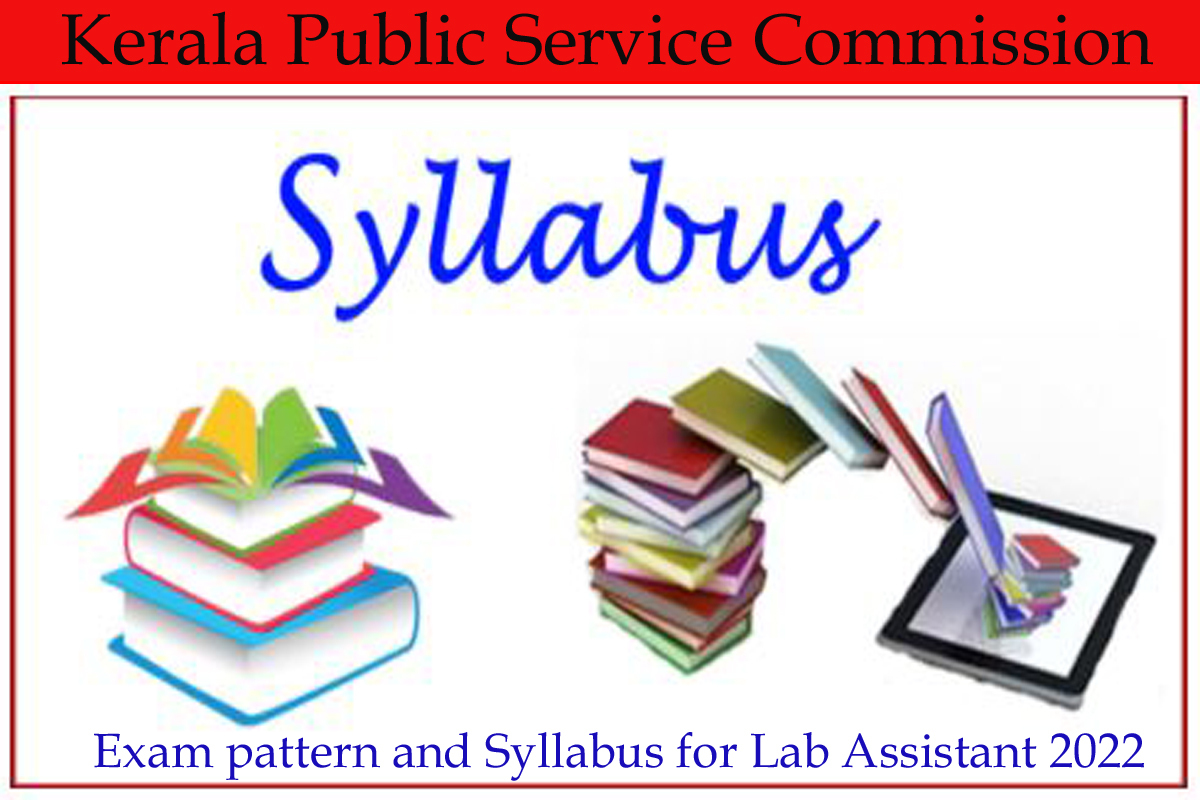Kerala PSC Lab Assistant Syllabus 2022 Download Pdf, Exam Pattern Check Here: The Kerala Public Service Commission has Declared the Exam pattern and Exam Syllabus for Lab Assistant on the Official Website @ keralapsc.gov.in. Candidates who applied and waiting for the exam can download the syllabus and Exam Pattern pdf to prepare for the Kerala PSC Lab Assistant. For more information candidates can read the entire article.
 Kerala PSC Lab Assistant Syllabus 2022
Kerala PSC Lab Assistant Syllabus 2022
| Kerala PSC Lab Assistant Syllabus 2022 Download Here | |
| Name of the Organization | Kerala Public Service Commission |
| Name of the Post | Lab Assistant (Part I – General Category, Part II – Fishermen/ Dependent of Fishermen category, Part III – Society Category) |
| Category | Syllabus |
| Syllabus and exam pattern Status | Available |
| Official Portal | keralapsc.gov.in |
Kerala PSC Lab Assistant Exam Pattern 2022
The Kerala Public Service Commission Released the exam pattern for the Lab Assistant applied candidates can check and prepare well for the Kerala PSC Lab Assistant examination.
| Maximum of Marks | 100 |
| Exam Duration | 1 hour 30 Minutes |
| Exam Type | Objective type |
| Language | English |
| Topics (Each Topic carry 10 Mark) | Fish Biochemistry and Nutritional Value |
| Fish Spoilage | |
| Fish Preservation | |
| Chilling of Fish | |
| Freezing of Fish | |
| Canning | |
| Fish Packaging | |
| Fishery By products | |
| Quality Control in Fish | |
| Handling of Fish onboard Fishing Vessels |
Lab Assistant Syllabus 2022 Kerala PSC
1. Fish Biochemistry and Nutritional Value: composition of fishmoisture, proteins, lipids, minerals, vitamins and non-protein nitrogen components. Nutritive value of fish – essential amino acids, essential fatty acids, polyunsaturated fatty acids, squalene, peptides, collagen. Vitamins in fish – water soluble and fat soluble- minerals of nutritive importance- macro elements – trace elements. Fish muscle – structure – protein denaturation – changes during heat processing (10 Marks)
2. Fish Spoilage: Post-mortem changes in fish–rigor mortis- autolysis, enzymatic spoilage, microbial spoilage, spoilage process – rancidityflavour changes. Freshness quality characteristics of fish – physicalchemical- microbial quality -Spoilage indices (10 Marks)
3. Fish Preservation: Traditional fish preservation techniques- curingdrying, salting, smoking,marinating, fermenting. Modern fish preservation techniques – chilling, freezing,canning, accelerated freeze drying, irradiation. (10 Marks)
4. Chilling of Fish: principles of low temperature preservation. Chilling methods- icing, refrigerated seawater system, chilled sea water system, refrigerated fish rooms, quality standards of ice – icing practices – types of ice – spoilage in chilled fish. (10 Marks)
5. Freezing of Fish – principles of freezing – methods of freezing – types of freezing- slow freezing – quick freezing – individual quick freezing – immersion freezing – air blast freezing – quality changes in frozen fish – dehydration – fat oxidation– drip loss- frozen storage – transportation of frozen fish- cold chain. (10 Marks)
6. Canning: principle of canning – thermal death time- canning processtypes of can – seaming –retortable pouches – spoilage in canned fishbotulism (10 Marks)
7. Fish Packaging: principles of fish packaging – packaging materials – properties – flexible packaging materials – biodegradable packaging materials – vacuum packaging – modified atmosphere packaging – labelling – standards of packaging materials (10 Marks)
8. Fishery By-products: fish meal, fish oil, fish hydrolysate, fish protein concentrate, fish ensilage, isinglass, fish paste, fish pickles, value added fish products battered &breading – fish wafers, surimi and surimi based value added products. Shrimp shell products- chitin- chitosan, glucosamine hydrochloride, seaweed products. (10 Marks)
9. Quality Control in Fish: organoleptic quality assessment- snsory, biochemical and microbial quality evaluation – spoilage bacteria and pathogenic bacteria – quality standards of fish and fishery products.Additives in fish- adulterants and prohibited chemicals. (10 Marks)
10. Handling of Fish onboard Fishing Vessels: landing centres, transportation, sanitation in fishing vessels, landing centres, processing centres. Standard sanitary operating practices, good manufacturing practices, traceability, HACCP, seafood safety standards, role of FSSAI.
Kerala Public Service Commission Official Website link: Click Here

